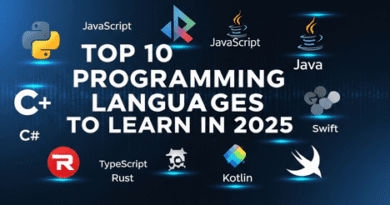College to Career Roadmap: Step-by-Step Guide for Students
🎓 Ultimate Roadmap: From College Freshman to Job-Ready Professional 🚀
Are you a student wondering how to go from classroom concepts to landing your dream tech job? Whether you’re just starting college or already halfway through, this step-by-step roadmap will guide you through every crucial milestone—from learning core skills to becoming interview-ready and beyond.
Let’s break it down into four clear, actionable phases:
📘 Phase 1: Building a Strong Foundation (Year 1–2 of College)
This phase sets the groundwork for everything that follows. Focus on core concepts, consistency, and curiosity!
1️⃣ Master a Core Programming Language
Choose a versatile language like Python, Java, C++, or JavaScript and dive deep.
🔍 Why it matters: Programming is the backbone of all software development. Mastering one language helps you understand syntax, control flow, functions, and object-oriented principles (if applicable).
🛠️ How to get started:
-
Enroll in beginner-friendly courses on platforms like Coursera, Udemy, edX, or freeCodeCamp
-
Practice coding on platforms like HackerRank, LeetCode, and Codeforces
-
Work on mini-projects to apply what you’ve learned
2️⃣ Learn Data Structures & Algorithms (DSA)
Understanding Arrays, Linked Lists, Stacks, Queues, Trees, Graphs, Sorting, Searching, and Recursion is critical.
🔍 Why it matters: DSA knowledge is a must for technical interviews at top tech companies.
🛠️ Resources:
-
Take DSA-focused courses on YouTube or platforms like GeeksforGeeks
-
Refer to the classic “CLRS” book (for deeper knowledge)
-
Practice daily on LeetCode and HackerRank
3️⃣ Version Control with Git & GitHub
Get comfortable using Git for tracking changes and GitHub/GitLab for hosting your code and collaborating with others.
🔍 Why it matters: Version control is a standard industry skill for managing and sharing code.
🛠️ Action Steps:
-
Complete Git tutorials on websites like GitHub Learning Lab
-
Start pushing all your small projects to a GitHub repository
-
Explore branching, merging, and pull requests
4️⃣ Understand Operating Systems & Computer Networks
Learn the basics of how your computer works under the hood.
🔍 Why it matters: Core knowledge of OS (threads, memory, processes) and networking (TCP/IP, HTTP, DNS) helps you understand application behavior.
🛠️ Study Tools:
-
College textbooks or NPTEL/YouTube lectures
-
Books like “Computer Networking: A Top-Down Approach”
-
Simulate network requests or OS tasks using small scripts
5️⃣ Get Comfortable with Databases (SQL & NoSQL)
Focus on learning SQL and understanding the basics of NoSQL.
🔍 Why it matters: Nearly every modern app interacts with a database.
🛠️ Action Plan:
-
Use sites like SQLZoo or Mode Analytics to practice queries
-
Design a simple database for a project (like a task manager)
-
Learn CRUD operations and database design
Also Read,
| How to Crack Campus Placements – A Smart Student’s Guide |
🛠️ Phase 2: Apply Knowledge & Gain Practical Experience (Mid-College)
Now it’s time to turn knowledge into skills.
1️⃣ Build Real-World Projects
Work on 2–3 major personal projects that solve real-world problems or reflect your interests.
🔍 Why it matters: Projects are your proof of work. They showcase your problem-solving skills and creativity.
🛠️ Ideas:
-
To-do list app
-
Budget tracker
-
Personal blog using a CMS
-
Weather app using an API
-
ML-powered spam filter
💡 Tips:
-
Use GitHub to document and host your code
-
Write a README file with setup instructions
-
Add screenshots or a live demo
2️⃣ Land Internships or Industrial Training
Seek out at least one internship by mid-college.
🔍 Why it matters: Internships give you a taste of professional life, enhance your resume, and sometimes lead to full-time job offers.
🛠️ Where to find internships:
-
LinkedIn Jobs
-
Company career portals
-
AngelList, Internshala, and Glassdoor
-
Tap into alumni and college placement cells
3️⃣ Explore Specializations 🔍
Experiment with niche fields to discover your interests:
💡 Popular Paths:
-
Web Development (Frontend/Backend/Full Stack)
-
Data Science / Machine Learning
-
Mobile App Development (Android, iOS)
-
Cybersecurity
-
Cloud & DevOps (AWS, Azure, GCP)
🛠️ Actionable Steps:
-
Enroll in beginner courses on YouTube or Udacity
-
Build mini-projects in that specialization
-
Join related online communities
4️⃣ Develop Soft Skills 💬
Tech skills get your foot in the door; soft skills help you grow.
🎯 Focus Areas:
-
Verbal and written communication
-
Teamwork and collaboration
-
Problem-solving and critical thinking
-
Time and task management
🛠️ How to improve:
-
Join student clubs and coding communities
-
Work on group projects and take leadership roles
-
Practice writing blog posts or giving presentations
💼 Phase 3: Get Job-Ready (Final Year)
Now is the time to polish your profile and prepare for the job market.
1️⃣ Advance Your DSA & Learn System Design Basics
Dive into complex problems and understand high-level architecture.
🔍 Why it matters: Companies like Google, Amazon, and Microsoft expect deep algorithmic knowledge and systems thinking.
🛠️ Resources:
-
Practice LeetCode Medium/Hard problems
-
Watch Gaurav Sen or Sahn Lam on YouTube for system design
-
Study concepts like scalability, caching, load balancing, CAP theorem
2️⃣ Build a Killer Resume & LinkedIn Profile
Create a concise, visually clean, and achievement-driven resume.
🛠️ Tips:
-
Use action verbs (e.g., “Built”, “Led”, “Reduced”)
-
Quantify impact where possible (e.g., “Reduced load time by 40%”)
-
List only relevant skills and projects
Also, update your LinkedIn:
-
Professional photo
-
Compelling summary
-
Projects, certifications, and experiences listed
3️⃣ Master Interview Skills (Technical & Behavioral)
✅ Technical:
-
Practice under time constraints
-
Think aloud and explain your logic
✅ Behavioral:
-
Use the STAR method (Situation, Task, Action, Result)
-
Prepare for questions like “Tell me about yourself” or “Describe a challenge you overcame”
🛠️ Mock interviews: Practice with friends, seniors, or platforms like Pramp or InterviewBuddy
4️⃣ Understand Job Descriptions & Tailor Applications
🔍 Why it matters: Recruiters are looking for relevant candidates, not generalists.
🛠️ What to do:
-
Analyze the job description (keywords, skills)
-
Highlight matching projects and skills in your resume
-
Customize cover letters to each role
5️⃣ Network Like a Pro
Make meaningful connections in your desired industry.
🛠️ How:
-
Attend hackathons, webinars, career fairs
-
Message alumni or professionals on LinkedIn (genuinely!)
-
Ask for guidance, not just job referrals
🔁 Phase 4: Lifelong Learning & Career Growth 🌱
Your learning journey doesn’t end after college!
🔄 Stay Curious, Stay Updated
🌐 Why it matters: Tech changes fast. Lifelong learners thrive.
🛠️ Keep growing:
-
Read blogs (like Medium, Dev.to, Hacker News)
-
Take online courses on new tech
-
Attend webinars and conferences
🤝 Seek Mentorship & Give Back
Finding a mentor can speed up your growth. Being one helps others and deepens your knowledge.
🛠️ How:
-
Reach out to seniors or professionals
-
Join mentorship platforms
-
Guide juniors or contribute to open-source
💡 Final Tips for Success
- Start Early: The sooner you begin, the easier the journey.
- Be Consistent: Regular effort beats intense short-term bursts.
- Focus on the Fundamentals: Master the basics—they never go out of style.
- Fail Forward: Mistakes are learning opportunities.
- Seek Feedback: From mentors, peers, or online reviewers.
- Define Your Dream: Understand what matters to you—learning, salary, growth, work culture—and aim for it.
📌 Ready to Begin Your Journey?
Bookmark this roadmap and start checking off your milestones one step at a time. Whether you’re just getting started or preparing for your dream job, this guide will help you navigate your path confidently.
👉 Don’t forget to explore our blog for more guides, interview tips, and learning resources tailored for aspiring tech professionals!
📤 Stay Updated with NextGen Careers Hub
📱 Follow us on Instagram
📺 Subscribe us on YouTube
Please share our website with others: NextGenCareersHub.in






Comments are closed.